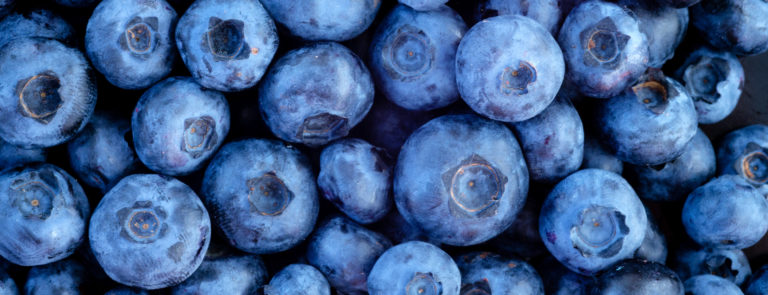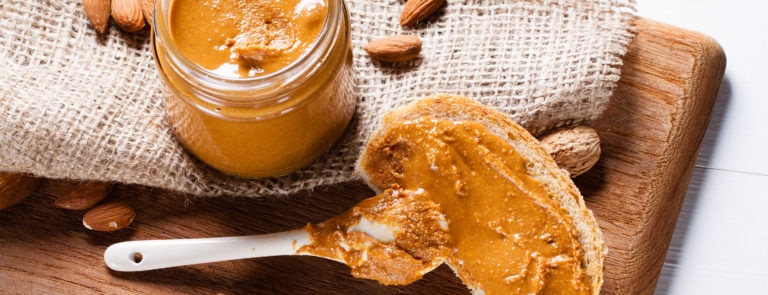10% off £35
8 health benefits of blueberries

Blueberries are commonly classed as being a ‘superfood’, but what are the proven health benefits of this fashionable purple fruit?
We talk you through all you need to know about blueberries, from how many of them to eat a day and what they contain, to those all-important health benefits. Keep reading…
What are blueberries?
Blueberries are a fruit that’s closely related to several other berries - cranberries, bilberries and huckleberries.
They look like round blue/purply berries that are around 5 to 16mm in diameter. There are several different types of blueberries, but the two most common varieties are highbush and lowbush blueberries.
Blueberries tend to be slightly juicy and have their own distinctive taste that’s not overpowering, with a hint of sweetness.1 (A little taste tip for you – cultivated blueberries taste sweeter than blueberries that are left to grow in the wild).2
Summary
Blueberries are small blue/purple fruits that are juicy and slightly sweet. There are several different types of them around – highbush and lowbush are the most common varieties.
Are blueberries good for you?
Blueberries are actually one of the first foods to have been given ‘superfood’ status.3
In fact, berries overall are among the most versatile sources of antioxidants, also known as phytonutrients, that help protect the body from cell damage. Different berries contain different levels of nutrients, with fresh berries packing a healthier punch than frozen berries.
As for if blueberries are good for us, they most certainly are (we’ve listed some of the main health benefits for you to take a look at below). However, word of warning, eat them in moderation because they do contain a fair bit of sugar. What’s more, dried berries contain only 20% of phytonutrients and higher sugar levels than the fresh variety.4
Handpicked content: How much sugar should you have a day?
Are blueberries healthy?
They are, providing you don’t eat them by the bucketful and you choose fresh blueberries over dried blueberries. To give you more of an idea of the sugar content, blueberries contain more sugar than any other type of berry (e.g. raspberries or blackberries).5 But on the plus side, blueberries happen to contain several different types of phytonutrients.
In addition to this, blueberries are recognised as being a good source of Vitamin C and manganese. Vitamin C is necessary for immune support and normal collagen formation. Meanwhile, manganese helps the body process cholesterol and nutrients, such as carbohydrates and protein. Blueberries are also a good source of dietary fibre.6
Summary
Blueberries have superfood status due to their antioxidant powers and ability to help keep the body healthy in so many different ways. They also contain Vitamin C, manganese and dietary fibre too.
Are blueberries high in sugar?
Yes, despite their size, blueberries do happen to contain quite a bit of sugar. One cup of blueberries contains around 15g of sugar, whereas raspberries contain 5g of sugar. But on the plus side, blueberries are also made up of several different types of phytonutrients.7
Are blueberries a superfood?
As we mentioned at the start, blueberries have long been classed as a superfood due to the fact they contain antioxidants and are a good source of Vitamin C, manganese and fibre.8 As a result, these small berries can potentially make a mighty difference by helping lower the risk of certain health conditions developing, among many other things.9
In the next section, we’ve explored the many health benefits of the fruit, so you can find even more reasons to enjoy blueberries as a sweet snack as part of your regular diet.
Blueberry nutritional value
A portion of blueberries is about a handful. Here are the key nutritional values for 100g of blueberries.
| Energy | Water | Protein | Carbs | Sugar | Fibre | Fat |
|---|---|---|---|---|---|---|
| 57kcal | 85% | 0.7g | 14.5g | 10g | 2.4g | 0.3g |
How many blueberries a day?
Blueberries are something that can be enjoyed every day, and two handfuls of blueberries, which is the equivalent of 4 heaped teaspoons, counts towards one of your five-a-day portions.10
Research has found that eating a cup of blueberries a day reduces risk factors for cardiovascular disease. While eating 150g of blueberries on a daily basis may help reduce the risk of cardiovascular disease by up to 15%.11
Summary
Blueberries do contain quite a bit of sugar, so it’s important you eat them in moderation. However, it is still possible for you to enjoy them on a daily basis, as they do count towards your five-a-day.
Benefits of blueberries
-
Antioxidants in blueberries
While most foods containing a high level of antioxidants are considered ‘superfoods’, there is no clear definition of the term.
However, blueberries contain one of the highest concentrations of antioxidants in any fruit, making them an excellent choice for topping your breakfast, adding to salads or snacking on throughout the day.12
Their vibrant purple colour, which is the result of naturally occurring compounds called phytochemicals, goes hand-in-hand with their antioxidant value.13 There are lots of types of phytochemicals in different fruits and vegetables. Those in blueberries, called anthocyanins, are associated with fighting free radicals.
-
Vitamin C
Blueberries, like many other berries, contain high levels of Vitamin C which has many essential functions in our bodies. They include protecting cells and keeping them healthy, maintaining healthy skin, blood, and bones and helping our immune system function normally.14
You should be able to get all the Vitamin C you need by eating a healthy and balanced diet. Since our bodies can’t store this essential vitamin, you’ll need to make sure you’re getting it in your diet every day. Eating a handful of blueberries is a delicious way to achieve this.
-
Blueberry fibre
Blueberries also contain soluble fibre, which helps keep your digestive system healthy and moving. The fibre in blueberries is also a food source for the good bacteria in your gut.15
-
Low in calories
Low in calories but high in nutrients, blueberries are a fantastic way for dieters to enjoy something sweet. These delicious berries are a satisfying and healthy dessert choice, whether you eat them on their own, in a fruit salad, or whipped into a tasty smoothie.
Use blueberries to replace any sugary sweets that you might usually enjoy and satisfy those cravings while looking after your body.
-
Blueberry benefits for skin
Topical blueberry skincare products may help with skin health because of their high anthocyanin (phytochemical) levels.
Further studies have also found topical products containing anthocyanins may help reduce the appearance of fine lines and wrinkles, thanks to their antioxidant properties.16
-
Blood sugar control
Test-tube studies have concluded that the anthocyanins in blueberries can have a beneficial effect on maintaining normal blood sugar levels.17
What’s more, further research on humans has found blueberries can improve insulin sensitivity. One particular study, in which obese people who were at a high risk of developing diabetes were given 2 blueberry smoothies a day for 6 weeks, saw an improvement in insulin sensitivity. It’s thought blueberries may also affect blood sugar levels directly after a high-carb meal by blocking certain digestive enzymes and reducing blood sugar spikes.
-
Heart health
Studies have found there is a link between berries (blueberries included) — or flavonoid-rich foods — and good heart health.18
This is due to their ability to inhibit the oxidation of LDL (bad) cholesterol, a key contributor to heart disease. Meanwhile, a separate study of 93,600 nurses found that a high intake of anthocyanins was linked to a 32% lower risk of heart attacks.
-
Brain health
Flavonoid-rich foods, such as blueberries, have also been connected to better brain function. It’s believed eating blueberries may prevent oxidative stress — which plays an important role in the aging process.19
It’s thought they can even slow down brain ageing and support memory function. In one 12-week study, drinking blueberry juice every day improved memory in nine older adults with early memory decline.
Summary
Blueberries may be small in size, but they can deliver so many health benefits, ranging from blood sugar control and improved heart health, to keeping your digestive system functioning and protecting the body against oxidative stress and damage.
How to eat blueberries
There are so many ways you can eat blueberries, sweet or savoury, morning or evening. Take a look at these ideas for some inspiration:
- Sprinkled on a salad for a sweet kick
- Mixed into pancake batter for an extra treat
- Blended into a smoothie
- Sprinkled over the top of cereal or porridge
- Layered with yoghurt and granola for a healthy dessert
- On their own!
To conclude…
Blueberries aren’t considered a superfood for nothing, you know. From their antioxidant powers to the fact they’re also a great source of Vitamin C, manganese and dietary fibre (not to mention the fact they’re a perfect sweet treat minus the calories), there are lots of reasons to be eating blueberries.
Whichever way you choose to eat them, we’re sure you’ll fall in love with this sweet and healthy fruit and find plenty of ways to add blueberries to your shopping list. It’s perfectly possible to enjoy blueberries every day.
Now that you’re here, take a look at this article, which contains some other ‘Healthy foods to eat every day.’
Last updated: 12 April 2021
- https://www.healthline.com/nutrition/foods/blueberries
- https://www.bbcgoodfood.com/howto/guide/health-benefits-blueberries
- https://www.bbcgoodfood.com/howto/guide/health-benefits-blueberries
- https://www.hopkinsmedicine.org/health/wellness-and-prevention/berry-good-for-your-heart
- https://www.hopkinsmedicine.org/health/wellness-and-prevention/berry-good-for-your-heart
- https://www.blueberrycouncil.org/blueberry-nutrition/health-benefits-blueberries/
- https://www.hopkinsmedicine.org/health/wellness-and-prevention/berry-good-for-your-heart
- https://www.blueberrycouncil.org/blueberry-nutrition/health-benefits-blueberries/
- https://www.webmd.com/diet/features/superfoods-everyone-needs#1
- https://www.nhs.uk/livewell/5aday/documents/downloads/5aday_portion_guide.pdf
- https://www.sciencedaily.com/releases/2019/05/190530101221.htm/
- https://www.bbcgoodfood.com/howto/guide/health-benefits-blueberries
- https://www.nhs.uk/conditions/vitamins-and-minerals/vitamin-c/
- https://www.nhs.uk/conditions/vitamins-and-minerals/vitamin-c/
- https://www.healthline.com/nutrition/foods-high-in-soluble-fiber
- https://www.healthline.com/nutrition/blueberry-benefits-for-skin/
- https://www.healthline.com/nutrition/foods/blueberries#benefits
- https://www.healthline.com/nutrition/foods/blueberries#benefits
- https://www.healthline.com/nutrition/foods/blueberries#benefits














